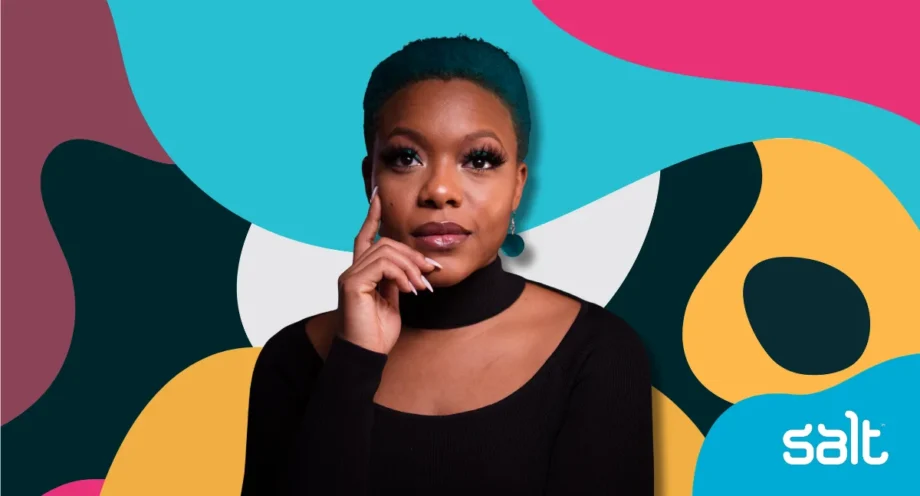Candidates, you have the power! How to interview your next employer
Interviews go both ways! Here's expert advice about how to leverage your power as a candidate over the interview table.

Interviews go both ways! Job interviews aren’t just about showing how you’re right for a role, they’re also your chance to see if the role is right for you. Chelsea Jackson, the Equity Architect, explains why and how candidates can leverage their power across the interviewing table. Here’s how to interview your next employer!
Introducing Chelsea
My name’s Chelsea Jackson. I’m a social scientist using social justice to change the business world.
Listen to our full conversation with Chelsea here
Read our full interview to learn what Chelsea is building as the Equity Architect here
Why do I say candidates have the power?
Few things are as expensive to a business as a vacant role.
A vacant role is not fun for a company because they’re overworking their existing employees to cover that role, or the work’s just not being covered. So, depending on what function of the business that role is, that vacancy can actually have a very sizable financial impact.
When you’re a candidate or you’re a new employee in an organisation, even if you’re moving into a new role within your current organisation, you have a leverage position. You have a higher net worth: you can get a higher salary or more benefits than an existing employee within that organisation.
This is why you have the power in the way you approach job interviews.
I’m speaking from a place of experience. I’ve been unemployed for nine months and applied to over 400 roles and was updating my CV and writing a new cover letter every day. I’ve been there. So, I’m not saying this from a privileged position of sitting up on high.
I’m saying this from a position of I’ve tried to bend and mould myself and my CV into any role, into any organisation, into any team, into any salary price point, just because I needed something to provide for myself and provide for my family.
But the reality is, you have to be just as discerning as the company that you’re interviewing with.
How to interview your next employer
1. Interview the company while they interview you
You are interviewing the company just as much as the company is interviewing you.
Just as much as they’re trying to determine if you are going to be able to exceed at all the parts of the job description, if you’re reliable and if you have the character traits they want and all those things, it’s your responsibility to find out if this is an organisation that supports people like you. If this organisation aligns with the values that you have.
When you’re applying — ask the important questions:
• What are the working conditions?
• What is the work-life balance?
• What is the pay?
That also means asking, ‘What is the take-home pay?’ So, not just what the salary that you’re negotiating is, but including those calculations on taxes and deductions and pensions, and actually looking into how much money would come into your bank account every month if you agree to this job at this salary price point.
Candidates should be asking organisations, can you handle me?
This means that whatever makes you thrive, whatever you need, whatever accommodations you might need, whoever you are that you’re bringing into that work space. You have to be working in an organisation that respects you for who you are, respects your hard work, respects your contribution, respects your skills and expertise and your background.
Candidates have to consider themselves and really sincerely interview the company.
2. Make sure it’s an environment where you are respected.
Respect doesn’t require you to assimilate or change yourself.
Respect says, I respect your background and what you’re bringing in and your approach and the way you dress and your hair, and all of those things.
You have to examine what’s important to you in terms of being able to show up as your best self and do your best work, and you need to ensure that the company you’re interviewing has the ability to provide that environment for you to be able to succeed and excel in your role.
That’s so important. That you’re coming from a mindset of, can this organisation handle me?
Is this going to be a conducive environment for me to not only do my best work, but also to live the life that I want to live? To have the work-life balance that’s important to me, whether you’re a parent or carer or whatever that looks like for you.
For me, I’m Neurodivergent. So, when I was interviewing and speaking with employers, that was something I disclosed in the interview. Not everyone’s going to feel comfortable with that.
Read our full interview to learn what Chelsea is building as the Equity Architect here
3. Get a full picture from outside the interview room!
You can go a step further than interviewing your interviewers by speaking to other people who work at the organisation.
Reach out to employee resource groups. Look at their online events. Connect with people who previously worked at the organisation and may have left recently to speak to them about their experience.
You could also try speaking to other people in the industry who are maybe at a different organisation but might be familiar with that company.
All of these are ways that candidates can do their fair due diligence to find out is this an environment that they’re going to be able to thrive in?
And I keep emphasising thrive because often when we’re coming from a place of being unemployed, pivoting, looking for a new role, just whatever is driving you to be a candidate in the current market, there is a lot of stress.
That stress is driving a lot of your decision-making. You have to be able to take that step back, give yourself that breather to actually ask yourself: Is this a company that I want to work in and that I can thrive in?
4. Remember you’re already enough for the right role
You are already good enough for the right organisation and the right role.
You are enough. You don’t have to do back flips and mental gymnastics. You don’t have to try and change yourself and try and change your CV and try and change who you are and change the way you dress and change the way you speak and take off your nail polish.
All of those things I felt like I had to do in order to excel in a professional environment, I don’t do now. And I’m doing better in my career than I’ve ever done just by being myself, just by believing that I’m enough.
When I encounter a client or a role or organisation, and I am not what they’re looking for, that’s not about me. That means I’m not what they’re looking for and I really hope they go and find that.
You don’t have to change yourself. If something’s not fitting or it’s not working, it’s because it’s not fitting and it’s not working. That’s okay. You don’t have to force it. You are enough.
There are spaces that are going to work for you, as long as you’re willing to grow and work and change and improve yourself, take critical feedback and apply it, for your betterment. You just remember that you are enough and that you don’t have to be so terrified all the time that you’re not enough and that you need to change yourself or mould yourself or be something else in order to be good enough.
You spend so much time at work — you have to be yourself.
Whether you work remote, hybrid in the office, whatever. You spend so much time at work and around the people that you’re working with, you also have to be yourself. In the sense that you have to be thinking about the team that you’re working with, the manager you’re working with.
What is your working style? Do you need someone who’s going to micromanage you, to remind you to do things? Or do you need a hands-off approach? Do you need teammates who you can troubleshoot and collaborate with, or do you want to work in a more competitive team to drive you to produce your best work?
When you look at an organisation, it’s so much more than just the job title:
• What is the salary?
• Who is the manager?
• What is the culture of this organisation?
• What’s the culture of this team?
• What do I need to succeed?
• What do I need to excel?
• What am I trying to get out of doing this?
5. Interview with what you want in mind
Very few candidates who are coming into the market right now have in their minds that this is where they want to be for the next 10 or 15 years, but there are people who do.
If this applies to you, if you’re coming in and saying, “I want to work my way up, I want to move into leadership”, think about this as your prepare for your interview:
- How do you position yourself at interview stage to ask the questions that are going to get you to where you want to be?
- If you’re looking at this role as a promotion for yourself, how are you preparing for the interview to help close the gap for the interviewer on your resume? How are you preparing for them to say, “Hey, you haven’t done a job at this level before”?
- How are you being thinking outside of the box in terms of what your work life looks like?
I created my own job title as an Equity Architect. I dreamed about working at a consultancy that was doing the level of performance and the quality of performance that McKinsey, BAE systems and BCG perform, but doing it from a completely different ethos and framework. I wanted to work at that company, but that company didn’t exist, so I started it.
There might be roles in organisations and industries that you haven’t looked at or thought about before.
Before I worked at WPP, I never thought about working in marketing, right, or advertising. That opened a whole new world to me, with roles like social strategists and others that I hadn’t considered. So, don’t confine yourself to the job role, look at the duties and the type of things that you want to be working on and trying to expand your search into new industries.
What I would say about being creative about your career path is that there might not be a set job title that you’re looking for. So, instead, ask yourself:
- What are the types of projects you want to work on?
- What are the type of initiatives you want to do?
- What levers do you want to have control over?
- What projects do you want to manage?
To help answer these questions, look at the types of activities that you enjoy doing or that you excel at, and then search for these. There might be job titles and job roles that you never even thought about.
If you’re finding that you keep hitting a wall in terms of recruitment, I would just emphasise again that you’re enough. You don’t have to change yourself, but it’s also important that you’re willing to grow.
Being a candidate applying for jobs, and being unemployed, is very difficult. Mentally, spiritually, physically, and in your relationships. It is difficult. So, cut yourself some slack, cut yourself some grace, and you know you’re enough. It’s going to be okay, and you’re going to find that role. You’re going to find that right organisation.
Keep up with Chelsea A. Jackson
I’m hosting a new show, the Post Woke podcast. Folks can go and check that out on wherever they listen to podcasts.
I have run a social justice campaign — Salary Justice — sharing video content on my YouTube and on my LinkedIn that really delves into the elements of that Star Trek world, and stepping stones to getting there.
Interested in the role equity plays in the business world now and in the future? Check out the World Economic Forum’s Schwab Foundation ‘Innovation for Equity’ report!
Also, keep an eye out for my upcoming research briefing with Echoing Green during Catalyst 2030’s Catalysing Change Week on Thursday, 9 May.
Check out my website for more information: equityarchitect.co/
Follow me on LinkedIn to keep up with my other projects!
You can also reach out to me on any of my social media accounts at @MissChelseaAnn or @EquityArchitect.
See our whole conversation with Chelsea Jackson
Read our full interview to learn what Chelsea is building as the Equity Architect here
Listen to our full conversation with Chelsea here


